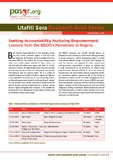| dc.contributor.author | Dayil, Plangsat Bitrus | |
| dc.coverage.spatial | Nigeria | en |
| dc.date.accessioned | 2019-01-28T10:22:56Z | |
| dc.date.available | 2019-01-28T10:22:56Z | |
| dc.date.issued | 2018-12 | |
| dc.identifier.citation | Dayil, P. B. (2018) Seeking Accountability, Nurturing Empowerment: Lessons from the BBOG’s Movement in Nigeria. Partnership for African Social & Governance Research (PASGR) | en |
| dc.identifier.uri | https://opendocs.ids.ac.uk/opendocs/handle/20.500.12413/14303 | |
| dc.description.abstract | Boko Haram’s brutal abduction of 276 secondary school girls from Chibok, Northeast Nigeria in April 2014 was the catalyst for the formation of the Bring Back Our Girls Movement (BBOG). The incident was just one among several violent and ruthless attacks executed by Boko Haram, an internationally prescribed terrorist group (see Table 1). In each instance of violence, the Nigerian government has been accused of remaining silent (or at times even denying the occurrences) and failing to take any decisive action. Yet in a context of
sustained violence and conflict in Northern Nigeria, the Nigerian women-led BBOG movement has not only maintained its focus on demanding government action for achieving the girls’ release, but has achieved much success including the release of around 160 of the girls, and the establishment of a national missing
person’s register. Alongside these successes, it has enabled the empowerment of its membership through capacity building and by providing a strong support system.
The BBOG movement can provide valuable lessons on advocacy for accountability on critical issues effecting the safety of women and youth-, and for empowering citizens in conflict and violence affected settings. This policy brief highlights the ways the movement has organised for citizen empowerment
and government accountability. It draws on findings from a study commissioned by the Partnership for African Social and Governance Research (PASGR) as part of the Action for Empowerment and Accountability research programme (A4EA), an international research programme led by the Institute of
Development Studies in the UK. This study investigated new forms of social and political action with a focus on BBOG movement.
Data was obtained through key informant interviews with BBOG leaders, members of the Chibok community, and with Chibok indigenes in Maiduguri and Abuja. Additional data was obtained from field observation at BBOG protest marches and sit-outs, the use of a structured online questionnaire and tracking of the movement’s online activities. | en |
| dc.language.iso | en | en |
| dc.publisher | Partnership for Social and Governance Research (PASGR) | en |
| dc.relation.ispartofseries | Utafiti Sera Research Brief Series; | |
| dc.rights.uri | http://creativecommons.org/licenses/by-nc-sa/4.0/ | en |
| dc.subject | Politics and Power | en |
| dc.title | Seeking Accountability, Nurturing Empowerment: Lessons from the BBOG’s Movement in Nigeria | en |
| dc.type | Series paper (non-IDS) | en |
| dc.rights.holder | PASGR | en |
| dc.identifier.team | Power and Popular Politics | en |
| dcterms.dateAccepted | 2018-12 | |
| rioxxterms.funder | Department for International Development, UK Government | en |
| rioxxterms.identifier.project | Action for Empowerment and Accountability Programme | en |
| rioxxterms.version | NA | en |
| rioxxterms.funder.project | d5bf6ce9-c132-438b-b27d-20b245939583 | en |


